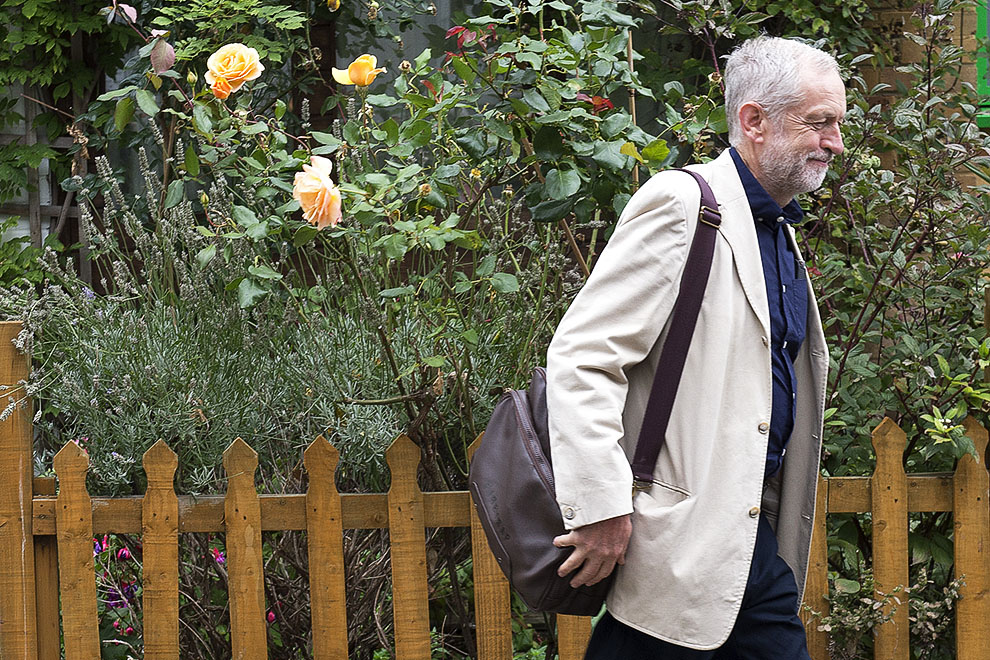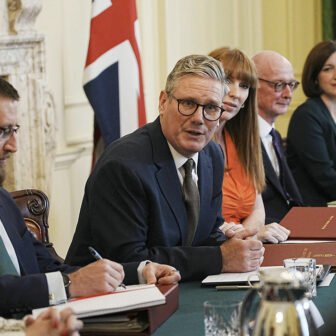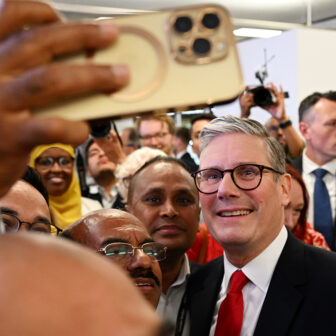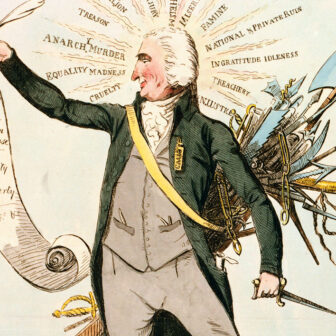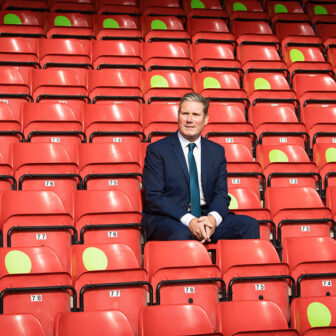So frequently foretold was the rebirth that it arrived almost as an anticlimax. At a special conference on Saturday, a short walk from the House of Commons, the Labour Party’s general secretary announced that Jeremy Corbyn was the party’s new leader. Cue cheers, hugs, smiles and backslaps from the assembled Labour tribe. After a fractious contest, the instinct for emotional unity matched the moment.
The gathering dissolved, the lights dimmed, the posters (“I voted for a new politics”) scattered. Nearby, central London’s riverside and streets teemed with life. Would history’s chronicle mark this day, I wondered, with a star or a shrug?
Corbyn, the member of parliament for Islington North, four miles north and a world away, has spent just under half his sixty-six years travelling between these two districts, a tribune of his constituents (and of many international causes) to the citadels of power. In the decades since becoming an MP in 1983, he has remained par excellence a “movement” figure, a champion of protest: chair of Stop the War, a campaign founded days after 9/11, while not (for example) steering a single bill into law. Indeed, his first act as leader was to speak at a nearby mass demonstration supporting refugees and opposing the bombing of Syria.
Labour was shattered by its unexpected defeat to the Conservatives in the general election on 7 May. After Ed Miliband’s immediate resignation, the chances of a shift further to the party’s left looked miniscule. Even Corbyn’s own coterie discounted it. Four months on, he has won a resounding victory against three centrist rivals, with 59.5 per cent of votes in the first round. The media was long prepared, but is still raiding the lexicon for words to convey the scale of what has happened. Geology (earthquake), astronomy (cosmic), war (insurgency), economics (asymmetric shock) or sociologese (tipping point)? Call it the greatest upset in Britain’s modern political history and few would argue.
For Jeremy and his comrades, veterans of meetings and marches across decades, it is the delicious triumph of a political lifetime. For the tens of thousands motivated by his campaign, many young, it is an ecstatic whoop of the powerful emotional current he has released. For the older, including former Labour members disillusioned by years of compromise and betrayal (under the hated Tony Blair especially), it is a late, heartwarming confirmation of the rightness of the true faith.
The great unknown on Saturday was less the result than how Corbyn, the eternal rebel, might have prepared himself for executive responsibility. (He has, after all, never served even in a shadow cabinet, and has defied the party whip 533 times since 1997 alone.) His victory speech – with its revealing aside that this was the hundredth event he had addressed during the campaign – suggested he had no intention of adapting. Instead of taking charge, he would be a vessel, accommodating the diverse energies of the reinvented party in a common fighting cause.
This “huge democratic exercise,” he said, shows Labour to be “passionate, democratic, diverse – absolutely united in our quest for a decent society that is possible for all.” The party has not just grown but changed in these weeks: it is “fed up with injustice and poverty,” committed to “a more equal and decent society,” fired by a “spirit of hope and optimism,” its “passion, integrity and demand for humanity intact.”
It now needed to challenge the “social cleansing of London,” end “the scourge of homelessness and desperation,” support “victims of war seeking a place of safety,” and “be a force for peace against global inequality and for a safer, better world.” There were great victories to be won, “not just elections but emotionally, for the whole of our society. Things can and will change.”
Like all Corbyn speeches – and I’ve heard a fair few – it was a “pudding without a theme,” thrown with complete self-assurance at an imagined audience of the already converted: inchoate, vapid, repetitive (“grotesque” and “passion” were today’s specials). There was no mention even of his main policy proposals, from state control of key industries and higher taxes on the rich to house-building and abolition of tuition fees. Corbyn and his team had known for many weeks that they were near certain to win. Yet it was immediately clear – an impression confirmed as the day unfolded – that no thought had been given to their first opportunity to speak to a nationwide public.
“A new politics”? For the hundredth time in these three months – after witnessing so much online poison, and attending some fervid rallies of ardent Corbynistas that had endless bitter denunciation but not a scintilla of genuine thought or debate – I recalled a profound line from François Truffaut’s Jules et Jim: “You wanted to reinvent love. But pioneers should be humble, without egoism.”
How on earth did the Labour Party land itself with Jeremy Corbyn? The impossible dream fertilised in 2014. A hasty reform of the party’s system for electing its leaders established a one-person-one-vote system across three constituencies: members, affiliates (mainly trade unionists) and registered supporters (qualifying on payment of £3, or A$6.50, and endorsement of Labour’s “aims and values”). This replaced the electoral college in which MPs, party members and trade unions each had one third of the total vote, and slashed the power of MPs in particular. Few anticipated the possible consequence: the creation, in effect, of a new electorate by a sudden infusion of those minded to back a particular candidate.
That is precisely what began to happen on 12 June when Corbyn – by a whisker of his trademark beard – hit the ballot deadline, thanks to support for his nomination from Labour colleagues who didn’t even support him but wanted only to “widen the debate.” From that moment the £3-ers soon swelled to 112,000, trade union affiliates to 148,000, and party members to 292,000. All categories favoured Corbyn, though his 84 per cent backing from registrees far outranked the 49.6 per cent from members – a sliver of consolation for rivals. (In 2010 both MPs and members chose David Miliband, but the trade union vote was just enough to hand his brother Ed the crown in the fourth round. Today, fewer than 10 per cent of Labour’s remaining 232 MPs explicitly back Corbyn, though many more will be biding their time.)
A qualified triumph of democracy, then. But how much also of ideology, of passion, of organisation, of panic, of social media, of values, of infiltration? The ingredients and the mix will be debated for years. So too will other aspects of the election process – among them the cathartic impact of the “JezWeCan” legions, the related influence of social media, and the mediocre performance of rival candidates. The answers will of course be strongly coloured by what happens next. But the 2014 remodel, and how it swept the Labour Party off its feet this year, will always be at the heart of the tale.
Where in all this are Labour’s women? Two have served Labour as brief stand-in leaders (Margaret Beckett in 1994 and Harriet Harman in 2010 and 2015), but Corbyn now becomes the eighteenth man to have held the post since 1906. If, this time, Liz Kendall’s against-the-tide effort fell short, Yvette Cooper – after an uneasy start – both assailed Corbyn’s policy agenda and led on the refugee crisis, but to no avail. That the new system gave the deputy leadership to the burly fixer Tom Watson, who defeated Stella Creasy and Caroline Flint on a third ballot, suggests that it’s not just prime minister David Cameron who (as Cooper never tires of saying) “has a problem with women.”
An emerging figure reflects as well as creates the political weather. No wonder the “Corbynmania” of Jeremy’s packed, delirious meetings invites comparison with Bernie Sanders (and even Donald Trump, unfair to Sanders though the comparison is): inside-outsiders whose fiery anti-establishment rhetoric and feelgood solutions to every problem have widespread appeal in times of insecurity and hunger for change. Some also cite Greece’s Syriza and Spain’s Podemos as closer parallels, though the trend is notably more muted since these radical coalitions hit trouble.
Overlaps exist. But politics is local above all. Labour’s post-election trauma – its vacuum of ideas, authority and leadership, the new party rules and the contingencies of Jeremy’s name on the ballot – explain much. Slick, tight, moneyed support from the trade unions and London activists then piled in. For a lost left, five years of Tory rule with no remission was a cliff-face without even a pickaxe for succour. Why not just go for broke? Moreover, Corbyn is a seasoned advocate of populist verities delivered to the faithful and the seekers with moralistic self-righteousness – thus very much in the spirit of the age. In short, many ingredients of his success are in clear sight. And that’s without even having to resort to “neoliberalism.”
There’s also the less tangible matter of anti-style, or what Jeremy’s admirers call “authenticity.” For all his thirty-two years in parliament, he is the anti-politician, the plain man who talks straight, unspun down to the market-stall string vests peeking out from under his tieless shirts. Here, the template is set by Boris Johnson, the carefully dishevelled Tory mayor of London and now also MP, and Nigel Farage, stridently blazered voice of the populist right. A more congenial precedent is the late Labour politician Tony Benn, with his pipe, tea mug and endless comforting homilies. Indeed, the wider English liberal-left’s ever-present yearning for an elderly lodestar – and that goes for the young too, in spades – is a neglected element of Corbynmania.
A three-month carousel has made its cultural mark. The New Statesman’s Anoosh Chakelian reports that many people are having “weird dreams” about Jeremy. A book, Poets for Corbyn, has been published, with verses so awful that even Private Eye’s great satirist Craig Brown would be hard-pressed to parody them. And the Spectator’s request for new politician-derived words and definitions got an inspired batch: “Corbynite” (“a rock from the Jurassic period, often found in boulder form in a sea of mud,” “Corbynaut” (“a light-hearted term for an adventurer in fantasy space”) and “Corbynara” (“piquant red sauce used to enliven pasta and party dishes, e.g. sorprese alla corbynara”).
Such whimsy hints that Corbyn’s public image, still being formed, might be only another whisker away from redefinition by a public that at last has decided to take notice. That will test the notion of authenticity which, after all, can also be a trap. You have to stay in character or try to move the story on, and either will be hard for Jeremy. For one thing, he loathes the press, the Morning Star and Islington Tribune apart. His speeches, and aides, can’t resist barbs. (John McDonnell – Corbyn’s close ally, sectarian far leftist, and new shadow chancellor – boasted on 10 September of replying to “a journalist from the Sun”: “You can be one or the other but you can’t be both.”) The day after his victory Corbyn shunned interview requests, a courtesy for any new leader. He also has a short fuse when questioned persistently about his record, regarding any such interrogation as automatically a “smear.” (He is reportedly taking legal action over a BBC Panorama portrait by the experienced reporter John Ware.)
For another, Corbyn can’t compromise on matters near his ideological core. A second shadow cabinet appointment reflects this difficulty: his removal of Ivan Lewis, a Kendall supporter, who was responsible for policy on Northern Ireland. That is all the more significant as the province is now in the midst of a political crisis, following a murder attributed to former members of the Irish Republican Army, or IRA (whose political wing is Sinn Féin). Lewis had offered to stay until the crisis passed. Prominent figures such as Chris Leslie, Yvette Cooper, Emma Reynolds, Tristram Hunt, Mary Creagh, Chuka Umunna, Jamie Reed and Liz Kendall have already resigned or declined to serve under Corbyn, though others not of his core persuasion – including Hilary Benn on foreign affairs and leadership candidate Andy Burnham on health – have accepted.
John McDonnell himself said in 1983 that it “was the bombs and bullets and sacrifice” of IRA members – here referencing one of the ten hunger strikers who died in 1981 – “that brought Britain to the negotiating table.” The view, albeit from decades ago, is a further illustration of Labour’s political shift, which the respected ITV political editor Tom Bradby described late yesterday as “a takeover of the Labour Party by left-wing activists.” Indeed, any previous Labour leader would have baulked at some of those voicing congratulations on Corbyn’s win: Argentina’s populist president Cristina Kirchner (who recognises a friend over Las Malvinas), Sinn Féin’s vulpine Gerry Adams (Corbyn is “a friend of Ireland”) and the Scottish National Party’s Nicola Sturgeon (offering that eternal chimera, a “progressive alliance”).
Jeremy Corbyn’s ascension guarantees the Labour Party’s further decline. It “would require a suspension of the laws of politics” for Corbyn to win an election, says Tim Bale, author of Five Year Mission: The Labour Party under Ed Miliband. But the Corbyn cult also caps off the intellectual and political retreat of rival currents in the party, and of the left more generally. As an editor of New York’s Partisan Review remarkedin the 1950s after encountering a text that echoed intra-left disputes two decades earlier. “These ideas are so old that I’ve forgotten the arguments against them!”
Don’t start from the good old things but from the bad new ones: it’s sound advice. There are profound lessons for democracy in the Corbyn cult. But also – as these months have shown – no shortage of brilliant, desolated people in the political and media worlds ready to grasp them. Their ideas may be needed much sooner than they know. •
